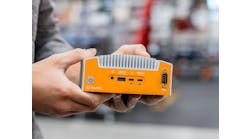I’ve been in systems integration for so long—more than 30 years—that I’ve come to realize the same tools are always needed, so I keep them in my trusty bag at all times (Figure 1). I usually know what I will be working on when I travel to a client, and those tools take care of most, if not all, of my needs.
Here’s a list of 21 tools system integrators need in their bags.
1. All-weather paper, pocket and regular sizes: Used for taking notes that won’t get easily destroyed in the field.
2. Pencil and pen combo: Everything you could possibly need to write with, all in one! My favorite is the Cross Tech3+ with black ink, red ink, and 0.5 mm pencil, but the Mitsubishi Premium Multi-Functional Pen & Pencil is great, too.
3. Multiple RJ45 Ethernet cables: I use these to connect to any Ethernet device in the control network. I carry good quality cables in three to four different lengths ranging from 6 ft to 25 ft, just in case.
4. RJ45-M12 Ethernet cable: When I need to make an Ethernet connection to a device, such as IO-Link, with M12 connectors.
5. Every USB connector available: You never know what connector you might run into while working with programmable logic controllers (PLCs), robots or printers.
6. Safety glasses: Most facilities will require you to wear safety glasses at least some of the time, but my vision is bad, so I have to wear expensive prescription safety glasses.
7. Earplugs: Many sites with large machinery and equipment require earplugs, and I prefer corded ones with a case, so I don’t lose them and they are kept clean and tidy during storage.
8. Multitool: Always handy to have, regardless of what you are working on. I have a Leatherman that hangs off my belt at all times.
9. Phone charger: I carry a USB wall base and a USB charger cable for when my phone runs low during work. I have used both Apple and Android phones for work, and like them both.
10. PLC Tools IP Explorer Professional: A great tool to find and assign IP addresses on any Ethernet device that you don’t know the IP address of.
11. PLC Tools SIM-ALP2 4-20 ma simulator and 0-10 Vdc generator: When you need to simulate analog inputs or drive analog output signals on PLCs or a distributed control system (DCS). I don’t always carry this, but I’ll bring it along if I’m going to a job with many loop checks.
12. Multimeter: Get a good multimeter! Make sure you have a high-quality lead set with alligator clips, so you don’t have to hold the leads while you work. Also, meters with a magnetic hanger are great because you can hang them on something metal instead of holding them. I prefer the Fluke brand, but these days there are a ton of acceptable ones. For the love of God, do not show up to a job site with a cheap meter from some retail chain store!
13. USB to Ethernet: I carry lightweight laptops that don’t have an Ethernet port, so I need this to connect to Ethernet devices. I’ve used several different brands, but I’m partial to TP-Link. I usually carry at least two with me, just in case I misplace one, and the ones with both USB and USB-C connections in one are awesome!
14. Insulated screwdrivers: You need a good screwdriver set for electrical work. There are lots of acceptable alternatives, but I prefer a smaller set just because of the limited space in my bag.
15. Wire cutters/strippers: In my line of work, I don’t need to strip and cut wires that often, so I carry inexpensive ones. But if you’re banging wires out all day, get professional strippers.
16. Fiber optic trimmer: I carry the free ones that usually come with fiber optic cables, but trimmers you pay for will work just as well. Too many times, I’ve run into a situation where someone cut fiber cables with diagonal cutters, which damaged the end of the cable and degraded the optic signal.
18. Backup computer: I like the Microsoft Surface because it’s lightweight and can double as a second monitor. My Surface has an i7 processor, 16 GB of RAM, and a 512 GB solid-state hard drive.
19. Portable monitor: I love that these give me more screen real estate. For example, I can view my PLC program on one screen and have the HMI program on the other. I’ve tried several of these, but I’m partial to ViewSonic. It’s very affordable compared to the competition.
20. Portable switch/Ethernet splitter: I need this a lot because often there aren't enough available Ethernet ports on the equipment I work with.
21. Wireless router: Useful to plug into a network to give yourself wireless internet access. I’ve tried several different brands, but I found that a smaller one is easier to pack in the bag. Be sure to check with your client before using, however. Some companies have policies regarding internet access.
Occasionally, I have to add something, such as cables or adapters, to the bag for specific jobs. Recently, I had to order a special programming cable for a client’s old Mitsubishi FX series PLC before I traveled to the site. The job is now complete, and that item has since been sent back to the office for “safekeeping,” meaning, if I need it again, it’s unlikely we’ll ever find it!
On that note, I lose stuff all the time: Ethernet cables, routers, small hand tools. Something often gets left at a site whenever I visit. Sometimes, I leave things on purpose because multiple people have found a use for it, and I can’t get it back without a fight! It’s just become part of doing business and doing right by our clients.
Apparently, I’m a troublemaker, according to the Transportation Security Administration (TSA). I have so much stuff in this bag that causes issues with them these days that I put my bag in a suitcase that I check at the airport front desk. I’m not sure what’s changed recently, but almost every time I open my checked bag, I find a TSA Notice of Baggage Inspection. I wonder what they must think!
The life of a system integrator is never without its challenges, but, with the right tools, we can tackle any problem that arises. The 21 tools listed here have proven their worth time and time again by providing convenience, improving efficiency and decreasing frustration. These tools have become my trusty companions and enable me to deliver exceptional service that exceeds our clients' expectations.
Sponsored Recommendations

Leaders relevant to this article:







